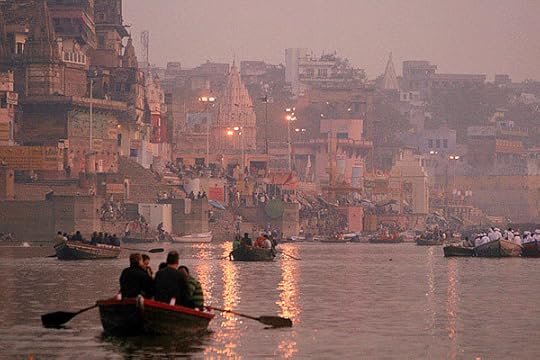What do you think?
Rate this book


210 pages, Hardcover
First published September 28, 2004
... one must read Herodotus’s book — and every great book — repeatedly; with each reading it will reveal another layer, previously overlooked themes, images, and meanings. For within every great book there are several others.Kapuściński undoubtedly suspected this would be his last book, and it seems likely he wanted this to be a “great” book (literally his magnum opus). In this context, Herodotus has a further role to play: to show how little has changed for the individual when great events crash in like a breaking wave — or seep in like a rising flood.
 The best part of this book is where us readers get a glimpse at the times when Kapuściński is setting out on his fledgling career
The best part of this book is where us readers get a glimpse at the times when Kapuściński is setting out on his fledgling career Herodotus’s opus appeared in the bookstores in 1955. Two years had passed since Stalin’s death. The atmosphere became more relaxed, people breathed more freely. Ilya Ehrenburg’s novel 'The Thaw' had just appeared, its title lending itself to the new epoch just beginning. Literature seemed to be everything then. People looked to it for the strength to live, for guidance, for revelation.
I overheard a conversation in the adjoining room and recognized Mario’s voice. I would find out later that it was a discussion about how to dress me, seeing as how I had arrived sporting fashions à la Warsaw Pact 1956. I had a suit of Cheviot wool in sharp, gray-blue stripes—a double-breasted jacket with protruding, angular shoulders and overly long, wide trousers with large cuffs. I had a pale-yellow nylon shirt with a green plaid tie. Finally, the shoes—massive loafers with thick, stiff soles.
 Here he is, in his yellow shirt!
Here he is, in his yellow shirt!
 At Sealdah train station, Culcutta, Kapuściński encounters poverty and distress that beggars belief:
At Sealdah train station, Culcutta, Kapuściński encounters poverty and distress that beggars belief: They were refugees from a civil war, which ended but a few years earlier, between Hindus and Muslims, a war which saw the birth of independent India and Pakistan and which resulted in hundreds of thousands, perhaps millions of dead and many millions of refugees.
 Hyderabad
HyderabadLater I traveled to Madras and Bangalore, to Bombay and Chandigarh. In time I grew convinced of the depressing hopelessness of what I had undertaken, of the impossibility of knowing and understanding the country in which I found myself. India was so immense. How can one describe something that is—and so it seemed to me—without boundaries or end?
India was my first encounter with otherness, the discovery of a new world. It was at the same time a great lesson in humility. Yes, the world teaches humility. I returned from this journey embarrassed by my own ignorance, at how ill read I was. I realized then what now seems obvious: a culture would not reveal its mysteries to me at a mere wave of my hand; one has to prepare oneself thoroughly and at length for such an encounter.
So K comes home and bones up on English language, Herodotus, and all things culturally Indian, whereupon he is promptly sent to China! The result is the same, he is so overwhelmed at the vastness of the subject. How I would love to go back to that young man as he wrings his hands at his desk back in Poland, and whisper in his ear that not one ounce of travelling and research was wasted, for in a few years all you will draw upon this broadening of the mind to become one of the world's best known travel journalists.
And so our intrepid green-stick flies to Africa: Cairo, Khartoum, smokes a little ganga for the first time, goes to a Satchmo concert, then into the Congo, all the while reading Herodotus, which I now have a burning urge to revisit.
5* The Shadow of the Sun
3* Travels with Herodotus
4* Imperium

"[Herodotus] calculates that this army--infantry, cavalry, and naval crews--numbered some five million men. He exaggerates, of course." (p. 198)So here we have Herodotus obviously exaggerating, and Kapuscinski is just mentioning it offhand instead of saying "OK let's re-examine what I said earlier about Herodotus's flawless methods of journalism". No, he just mentions it as if it's totally OK, a minor quibble. Of course, I don't blame Herodotus: he was one of our first recorders of history, so kudos to him for at least trying. But I found it kind of disingenuous for Kapuscinski to hold Hero(dotus) up as this gold standard, and then ignore everything that doesn't fit into his theory.
There is no way around this divergence of purpose and means [i.e., between the objective and subjective viewpoints]. We can try to minimize or mitigate it, but we will never approach the objective ideal. The subjective factor, its deforming presence, will remain impossible to strain out. Herodotus expresses an awareness of this predicament, constantly qualifying what he reports: "as they tell me," "as they maintain," "they present this in various ways," etc. In fact, though, however evolved our methods, we are never in the presence of unmediated history, but of history recounted, presented, history as it appeared to someone, as he or she believes it to have been. This has been the nature of the enterprise always, and the folly may be to believe one can resist it.Earlier, he says:
This fact is perhaps Herodotus's greatest discovery.
The first to realize the world's essential multiplicity was Herodotus. "We are not alone," he tells Greeks in his opus, and to prove this he undertakes his journeys to the ends of the earth. "We have neighbors, they in turn have their neighbors, and all together we populate a single planet."As one who envies Kapuscinski for his many great books about his travels, and as one who has read Herodotus twice (for apparently good reason, and now I know why), I can see that I could form a similar attachment to the Greek historian.